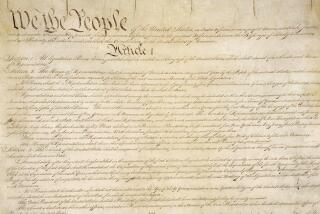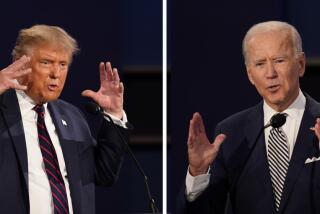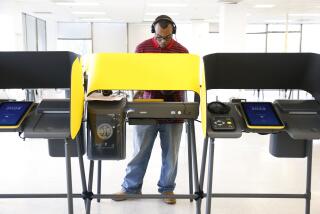Vice president: a split-ticket vote?
The question of Gov. Sarah Palin’s presidential qualifications just won’t go away. With the denunciations mounting, it seems likely that in a head-to-head election against the Democrats’ vice presidential choice, Sen. Joe Biden, Palin would lose.
And yet, because we vote for tickets, not individuals, when it comes to the vice presidency, Palin still stands a good chance of ending up first in succession to lead the free world.
That brings up an important question: Why are voters denied the chance to vote for a president of one party and a vice president of the other? After all, voters often split their votes in other ways: between a president of one party and a House member or senator of the other; between federal representatives of one party and state representatives of the other. Why not let voters consider making Biden’s offhand comment during the primaries this spring -- that he could envision serving as John McCain’s vice president -- a reality?
In fact, nothing in the U.S. Constitution or in federal election law requires that voters in each state must choose between unified president/vice president party tickets. In early American history, the men serving in the top and second jobs came from opposing parties. In 1796, Thomas Jefferson served as John Adams’ vice president, even though the two bitter rivals represented and headed opposing parties. At the time, some even thought a “split” executive promoted checks and balances and was thus something to be embraced, not lamented.
However, with the increased strength of the national political parties, each state began to structure its presidential election ballot so as to require voters to pick between opposing executive slates rather than allowing voters to choose separate presidential and vice presidential candidates.
Some decisions by states -- which set most presidential election rules -- as to how to structure ballots can be explained by the desire to maximize clout.
For example, almost every state awards its electoral college votes on a winner-take-all basis rather than proportionally. So, if Barack Obama wins California 55% to 45%, he still gets 100% of the state’s electoral college votes -- the biggest possible reward for taking California’s concerns and issues seriously during the campaign and in the future. Those few states that allocate electors proportionately are at a competitive disadvantage relative to the others.
But states could stop tying the vice president into the deal without changing the winner-take-all approach, so there wouldn’t be obvious harm to their relative influence. And even if a president resented serving with a vice president from an opposing party, why not leave it up to the voters whether to take that risk or avoid it, as they already do in deciding whether to split their tickets in other ways?
After all, voters given the option of executive ticket-splitting might not invoke it. In fact, there would be strong policy reasons for voters ordinarily to prefer having a president and a vice president of the same political party, including day-to-day effectiveness in the executive branch and continuity in the rare instances in which a president becomes disabled or leaves office.
But those policy reasons might be overcome when there are unusual vice presidential candidates. The election of 1988, when Dan Quayle and Lloyd Bentsen were the vice presidential competitors, might have been such a contest.
The same might be true this year. If states didn’t bind voters to unified tickets, the GOP and its candidate, McCain, might not have chosen the nationally untested Palin for vice president in the first place.
Our general American preference for letting voters weigh all the competing policies and personalities would seem to make the current unified top of the ticket at least worthy of reconsideration.
In the end, unbinding voters probably wouldn’t change which party wins the White House. But it would inject more competition into the vice presidential stakes, and that might improve the quality of vice presidential picks. That’s something both parties should think is a good thing.
Vikram David Amar is a law professor at UC Davis.
More to Read
A cure for the common opinion
Get thought-provoking perspectives with our weekly newsletter.
You may occasionally receive promotional content from the Los Angeles Times.






